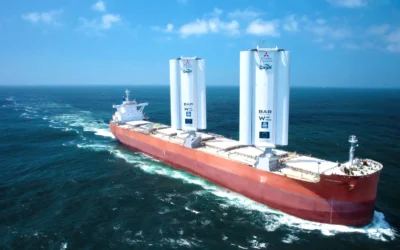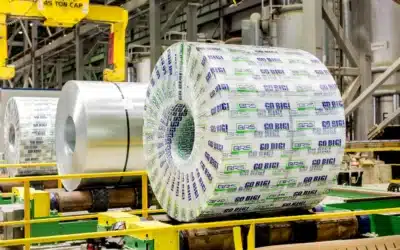The UK’s first experimental glass furnace combining green electricity, hydrogen and biofuels has begun operation, targeting a 56% carbon emissions cut. The £54m national initiative showcases scalable, low-carbon production with Siemens digital control, pushing the glass sector towards a net zero future.
An experimental glass furnace in St Helens, United Kingdom, was recently lit for the first time, marking an important step in the industry’s push towards lower carbon emissions. The new furnace operates using a mix of green electricity, hydrogen, and biofuels and is capable of reaching temperatures of 1,593C. It can produce over two miles of flat glass daily, a demonstration of both industrial capacity and innovation in sustainable manufacturing. According to Glass Futures CEO Justin Kelly, the facility is unique globally for its use of such a wide variety of sustainable fuel sources, including electric melting, aiming not only to decarbonise glass production but to transform global manufacturing practices.
This furnace forms part of a broader £54 million research and development initiative employing Siemens’ latest digital control system, PCS Neo, which unifies plant operations and allows for precise real-time monitoring and optimisation. This improved control enables rapid innovations on a pilot scale, smaller than typical industrial lines but designed for scalable results. The electric boosting system within the furnace, equivalent in power to the energy use of 2,000 homes, supports glass melting at greater speed and with up to a 56% carbon emissions reduction. This aligns well with British Glass’ Net Zero Glass Strategy, highlighting a concrete pathway to environmental targets.
The industry-wide context underscores the significance of such developments. The foundation industries—comprising glass, ceramics, steel, metals, chemicals, paper, and cement—account for roughly 10% of the UK’s carbon emissions (more than 20% on a global scale).
Glass, in particular, is infinitely recyclable and an excellent sustainable packaging material, making its decarbonisation a high priority. Industrial trials with liquid biofuels and electric-boosting at an industrial scale have already demonstrated the potential for significantly reducing reliance on natural gas and other traditional fuels, accelerating efficiency and lowering emissions.
Additional efforts across the UK glass sector complement this progress. For example, O-I Glass in Harlow has successfully trialled replacing natural gas with 100% biofuel in its furnace, a project supported by the UK government’s Net Zero Innovation Portfolio. Similarly, Pilkington UK, part of the NSG Group, conducted a four-day trial using 100% sustainable biofuel, producing the lowest carbon float glass ever made. These trials consolidate knowledge and prove the commercial viability of sustainable fuel alternatives.
Further ambitious projects include Encirc’s partnership with Diageo to create net zero glass bottles by 2030, with plans to operate a furnace at their Elton plant using green electricity and low-carbon hydrogen, expected to reduce carbon emissions by up to 90%. This initiative aims to produce up to 200 million bottles annually, illustrating the scalability of sustainable glass manufacturing technology.
Glass Futures itself published a comprehensive report for the UK Department of Business, Energy and Industrial Strategy, indicating that no single solution will suffice for full decarbonisation of glass manufacturing. Instead, a combination of sustainable fuels and technologies—electric melting, biofuels, hydrogen, and optimized process controls—will be essential to meet carbon reduction goals, which could reach up to 80% with continued innovation.
The development of the St Helens pilot furnace, supported by advanced automation and sustainable energy inputs, could be a transformative moment for the glass industry. It embodies the multi-faceted approach required to tackle one of manufacturing’s most pressing challenges: reducing environmental impact while sustaining productivity and quality in a vital global sector.




